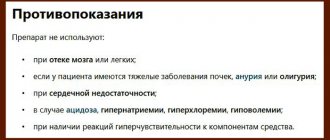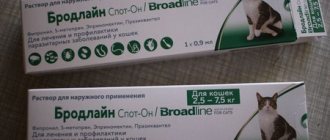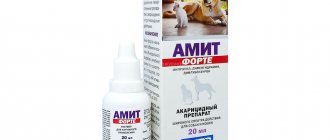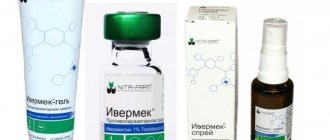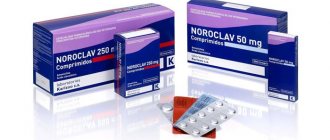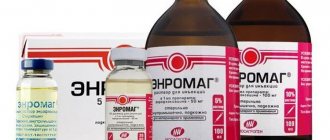Cases of various types of intoxication in domestic and farm animals are, unfortunately, not uncommon. To alleviate the condition of patients in veterinary clinics in case of poisoning, a special type of drugs is used - designed to restore electrolyte levels. One such medicine is Ringer's solution. Instructions for using this particular product, which has earned good reviews from consumers, will be discussed below in the article.
In veterinary medicine, this remedy is used quite often. This solution can be used for cats, dogs, rabbits and other animals.
Release form and composition
This product is supplied to veterinary clinics and pet stores in the form of a solution intended for injection. It is a colorless transparent liquid. The substances in the Ringer-Locke solution include the following:
- sodium bicarbonate;
- sodium chloride;
- potassium chloride;
- calcium chloride hexahydrate.
Distilled water is used as a solvent in the preparation of this solution. This medicine is supplied to the market in sealed sterile bottles of 100 or 200 ml.
Features of the drug
This remedy is usually used in the same cases as an isotonic solution of sodium chloride (table salt). However, it is also more physiological and closer to blood plasma. This feature of the drug also explains the high degree of effectiveness of its action.
After injection, Ringer-Locke solution is quickly absorbed and distributed into the tissues of the animal. At the same time, it does not have any irritating effect on the animal’s body. The positive effect provided by this drug is primarily due to the fact that it is able to quickly normalize the water-salt and acid-base balance.
Storage conditions
- Ringer's solution must be stored in its original packaging.
- The place in which the drug is stored must be clean and dry. It is worth preventing direct sunlight from hitting the medicine.
- Storage temperatures can vary from zero to twenty-five degrees Celsius.
- The drug is valid for two years from the date of manufacture.
It is produced in the form of an injection solution, the active ingredients of which are sodium chloride (0.8 grams), potassium chloride (0.02 grams), calcium (0.02 grams), sodium bicarbonate (0.1 grams) and glucose.
One hundred milliliters of water for injection is also available as a solvent. The drug is sterile and appears as a clear, colorless liquid in appearance. The product is packaged in glass bottles with a capacity of ten, twenty and one hundred milliliters. The bottles are hermetically sealed with rubber stoppers protected by rolled aluminum caps. Each container must have a label indicating the name of the drug, manufacturer, volume in milliliters, expiration date, serial number, method of use, storage conditions, and the words “Sterile” and “For Animals.” Instructions for use must also be included.
Properties
Ringer-Locke solution
designed to regulate acid-base and water-salt balance in the body of various animals. From the point of injection, the product, after administration, is quickly absorbed and distributed throughout the tissues and organs of the animal, without irritating them.
Application and dosage
Ringer-Lock solution is used intravenously or subcutaneously. For subcutaneous injections, the principle of fractional injection into different places should be used.
The dose for cattle and horses ranges from one thousand to three thousand milliliters. For calves up to one year old - 200-400 milliliters, and for small cattle the dose is ten times less than for large cattle - 100-300 milliliters. The lowest dose for piglets and lambs is 25-100 milliliters. The exact doses and timing of use are determined by the characteristics of the disease and the weight of the animal. The solution must be prepared immediately before use, taking into account the requirements for the preparation of such liquids. The application is the same as for isotonic NaCl solution.
Side effects
There were practically no complications or side effects when using the product in recommended doses. However, if Ringer-Locke solution is used in increased volumes, overhydration and chloride acidosis may well develop. If the development of such complications is noticed, the dose should be reduced or the drug should be discontinued altogether. When treating with Ringer-Locke solution, the use of other medications is allowed.
Contraindications
It is not allowed to administer Ringer-Locke solution intravenously if the excretory activity of the kidneys is clearly impaired.
Both during and after treatment with Ringer-Locke solution, animal products can be used without restrictions. Working with this solution requires compliance with the general safety, sanitation and personal hygiene rules that are prescribed for working with medicinal products for animals.
Storage
The drug should be stored in the manufacturer's containers and packaging, closed, protected from direct sunlight, dry and inaccessible to animals and children, away from feed and food. Storage temperature range is from zero to twenty-five degrees. The shelf life of Ringer-Locke solution is two years from the date of its release; after this period, the product is considered unsuitable and must be disposed of in the prescribed manner.
Indications for use
According to the instructions, Ringer-Locke solution can be administered to animals:
- for dysentery, vomiting, diarrhea and food poisoning;
- various types of thermal injuries - frostbite, burns;
- inflammation of the peritoneum;
- intestinal obstruction;
- bites from poisonous spiders or snakes;
- blood loss.
In addition, it is used for plasmapheresis.
Since Ringer's solution is compatible with many veterinary medications, it is often used as a solvent in the treatment of other medications. But the combination of drugs in this case should, of course, be selected exclusively by a specialist. This solution should not be used simultaneously with certain medications.
Directions for use and safety precautions
The instructions recommend using Ringer's solution only for intravenous infusion. Sometimes this medicine is also used as an external remedy. Thus, it is used, for example, for washing wounds and mucous membranes if necessary.
In some cases, the instructions for using Ringer's solution for animals allow it to be administered intramuscularly. But injections of this medicine are usually given in this way when treating only kittens, rabbits and puppies, and if the animal is actually very ill. In young veterinary patients, finding thin veins is, unfortunately, often very difficult.
Ringer's solution does not belong to the class of harmful and dangerous substances. However, when using it to treat animals, of course, one should adhere to the standard technology for using veterinary drugs. Injections of this medicine, for example, must be done wearing medical gloves.
Instructions for use of Riegner-Locke solution: dosage of the drug
You cannot prescribe this medicine to an animal on your own. Treatment is carried out only after visiting the clinic on the recommendation of a veterinarian. Only specialists usually inject this medicine into animals. In this case, the veterinarian chooses the dosage of Ringer’s solution depending on the specific disease and the weight of the animal.
For adult cats, for example, the drug is usually used in an amount of 100-150 ml per day. In this case, its single dose is 50 ml.
Ringer's solution for cats with chronic renal failure
To reduce azotemia in the compensated stage of chronic renal failure, a laxative is used: Duphalac has a hyperosmotic, laxative effect, enhances intestinal motility, and promotes the excretion of ammonium ions. The dose of the drug is selected individually from 1 to 5 ml per animal 1-2 times a day.
Also, in the treatment of chronic renal failure, enterosorbents are used - they are able to adsorb ammonia and other toxic substances in the intestines. Enterodes is a drug that is most often used as a sorbent.
The drug is taken orally, 1-2 hours after eating or taking medications, diluted at the rate of 2.5 g of powder per 50 ml of cold boiled water. Prescribed at a rate of 0.3 g/kg body weight/day.
The drug is given to the animal 3 times a day.
https://youtube.com/watch?v=Oczk1WX5Ho0
Fluid therapy is indicated if the animal is severely dehydrated and levels of urea and creatinine will be elevated. IV drips will help provide immediate hydration. This is best achieved by placing an intravenous catheter and administering an isotonic, balanced fluid such as lactated Ringer's solution or saline.
During intravenous infusions, it is necessary to periodically check the patient's blood counts. In most cases, indicators begin to change for the better within the first day.
In the treatment of chronic renal failure, intravenous infusions are prescribed in a volume and in a course that corresponds to: the size of the animal, the degree of dehydration and the levels of urea and creatinine.
Subcutaneous infusion can be used continuously in the treatment of chronic renal failure and is aimed at eliminating dehydration.
Dehydration may develop because as the disease progresses, the cat may stop drinking or the animal may vomit frequently.
The amount of subcutaneously administered fluid may vary depending on the size of the animal, 125-150 ml is administered to large animals, and 75 ml per day may be sufficient for small animals.
If infusion therapy is ineffective in the treatment of chronic renal failure, peritoneal dialysis (link to acute renal failure) can be used, which can be carried out both in a clinic setting and on an outpatient basis.
A protein- and phosphate-restricted diet is used, which reduces the production of nitrogenous products. Both canned and dry foods are used, and canned diets provide an additional source of fluid. Frequent weighing of the animal and monitoring of the amount of feed consumed is necessary.
If the animal's appetite decreases, it is necessary to increase the amount of food eaten.
There are different methods: you can use different forms of food (alternating dry and wet food); feed should be heated; using only fresh food (uneaten canned food must be changed every 6-12 hours); Sometimes cats and dogs are more willing to eat food from the owner's hands in small portions. If the animal does not eat on its own, it is necessary to use tube feeding.
Chronic renal failure is an irreversible disease. With constant treatment and monitoring the development of the disease, the animal’s quality of life can be maintained at a high level, and the life expectancy of a sick animal can last from several months to several years.
Infusion therapy in the treatment of chronic renal failure
When treated for chronic renal failure, creatinine levels may drop to normal in some animals, persist for several months, and then rise again.
It is important for owners to understand the temporary nature of this phenomenon and not stop treatment for chronic renal failure.
When using ACE inhibitors, hyperkalemia may develop due to potassium retention. When benazepril and potassium are combined, the animal's serum potassium levels should be checked every 2 to 4 weeks. If hyperkalemia occurs, it is necessary to stop taking or reduce the dose of potassium.
To use sodium bicarbonate internally: add 17 teaspoons of baking soda per liter of water. The solution is stable for 3 months when stored in the refrigerator with the lid closed.
Contraindications for use
Ringer-Locke solution helps animals with intoxication very well. But, unfortunately, this remedy cannot be used to treat cats, rabbits, horses, dogs, etc., in all cases. According to the instructions for use of Ringer-Locke solution, it cannot be prescribed if the animal has, for example, problems such as:
- swelling of tissues or brain;
- heart failure;
- anuria;
- oliguria;
- severe kidney damage.
In case of edema, this drug can aggravate the situation of the animal. The use of the drug in this case often even leads to death. Among other things, when this remedy is used in the body of cats, dogs, etc., blood flow accelerates. In heart failure, the drug can therefore actually be very harmful. In this case, the heart may simply not cope with the increased blood flow. And this, in turn, unfortunately, can lead to the death of a pet.
Ringer-Locke solution should be used with caution, according to the instructions, for acidosis, hypovolemia and other similar diseases.
How to administer Ringer's solution to a cat?
Beloved tailed pets are not immune to various types of intoxication. It is not clear what toxin your pet was poisoned with this time, but Ringer's solution for cats is usually used. The main advantage of this drug is its safety for the animal, but it allows you to save your cat in seemingly hopeless cases.
Composition of Ringer's solution and dosage for animals
The composition of this unique panacea is simple; in addition to water, it includes:
- sodium chloride NaCl 0.9%, common table salt;
- calcium chloride CaCl2, the buyer encounters calcium salt on packages in the form of E509, it is considered a safe food additive;
- sodium bicarbonate, otherwise baking soda, NaHCO3;
- Glucose, a source of easy production of solar energy by the body, is found in fruits and berries.
The composition of blood plasma is approximately the same, so no cases of overdose have been identified.
Forms of release of the drug:
- in glass bottles, volume either 200 ml or 400 ml;
- in plastic bags for injection 500 ml.
What are the manifestations of intoxication and what causes them?
Intoxication manifests itself in different ways. Vomiting with diarrhea may occur, the animal will lie exhausted, frightening the owner with its dying appearance; in severe cases, blindness may occur or bleeding will begin.
To prevent your pet from crossing the dangerous line, use Ringer's solution for the cat.
A cat can be poisoned by lead compounds, which are present in paints in old houses, for example, in zinc white. Intoxication often occurs from cigarette smoke, from low-quality food made from unknown ingredients.
Mechanism of action of Ringer's solution
Baking soda has the unique ability to bind many toxins, in particular heavy metals, and remove them from the cat’s body in the form of insoluble compounds. An additional advantage of Ringer's solution is its harmlessness and the absence of irritating components.
Application in practice
If your kitten has been poisoned and is barely breathing, it is unlikely that it will be possible to find thin veins due to dehydration, so Ringer’s solution is injected subcutaneously into the cat’s muscle tissue.
Since its composition is close to plasma, Ringer's solution is instantly absorbed by the body's cells. This helps save the cat from dehydration.
There is a serious warning for using the solution to dissolve any medications. The salts included in its composition can enter into various compounds with the substances present in the medicine, and it is not clear what can happen to the cat as a result of this.
RINGER-LOCKE solution does not contain glucose. Often its use is not so effective in cases of animal poisoning, since it is glucose that helps the liver remove toxic substances.
Indications for use
If an animal is attacked by a tarantula or bitten by a snake, the venom entering the bloodstream causes red blood cells to stick, which can lead to thrombosis and death. In this case, it is necessary to inject Ringer's solution into the vein.
In cases of diarrhea, to quickly saturate the tissues with a liquid similar in composition to blood, the drug is used subcutaneously in the form of injections.
Sometimes the life of an animal hangs in the balance if pleurisy or peritonitis is diagnosed. The first thing they do is use this reliable, never-failing remedy.
The dosage of the solution for a cat is calculated depending on the weight of the animal and its age. Typically, daily intake is from 100 ml to 150 ml, and a single dosage is from 40 ml to 50 ml.
What contraindications are there?
If a cat is diagnosed with severe tissue edema or even cerebral edema, it is necessary to understand that the administration of Ringer's solution will aggravate the situation, leading the animal to an even worse condition.
If heart failure is detected, the use of medication is excluded so as not to increase blood flow, since the weakened heart muscle may not be able to cope with the increased load.
In cases of severe kidney damage, such as oliguria, when urine passes slowly, the use of Ringer's solution will also increase swelling and can be fatal.
Ringer's solution is also used to save other animals. In cases of snake bites, this is a quick fix for your dog. The indications for the use of Ringer's solution and contraindications for both cats and dogs are similar.
Side effects
Ringer's solution belongs to the group of safe drugs. No side effects are usually observed when treated with it in animals. Only occasionally can pets experience allergic reactions to this medicine. In this case, the drug should, of course, be stopped.
Of course, when using this product you must strictly follow the dosage. If too much medication is administered to an animal, it may experience chloride acidosis and overhydration. If an animal develops such conditions, the dose of the drug it takes should be reduced or the solution should be discontinued altogether.
latest comments
Tatyana: Hello! You can order Goldline 15 mg 60 capsules (without a prescription?)
Anna M.: An excellent drug, worth the money. Thanks to him, I escaped with little blood.
Anastasia: Excellent drug.
Anastasia: The drug is good, the quality is even better than the price, it helps a lot, even if there are bad ones about it.
All materials presented on the site are for educational purposes only and are not intended for medical advice, diagnosis or treatment. The site administration, editors and authors of articles are not responsible for any consequences or losses that may arise when using site materials.
LLC "Medstorona - Medical Technologies" OGRN 1182375072802 All rights reserved 2011-2020
Analogues of the drug
The instructions for using Ringer's solution are described above. In veterinary medicine, this medicine is used very often. And this remedy helps animals very well against intoxication. At the same time, Ringer's solution is inexpensive. The price for a bottle of the product in veterinary pharmacies is usually no more than 50-60 rubles. But of course, if necessary, this drug can be replaced with some of its analogues.
For example, the following drugs have the same therapeutic effect as Ringer-Locke solution:
- "Regidron", produced in powder form and intended for oral use. This medicine is usually used to treat dehydration in animals due to diarrhea.
- Hartmann's solution. This remedy is used in approximately the same cases and in the same dosages as the Ringer-Locke solution.
Similar drugs
Ringer's solution from Solopharm has analogues, the most common is Acesol. The medicine consists of potassium chloride, acetate, sodium. Active substances are diluted with pharmaceutical water. Acesol is intended for intravenous administration; it is a diuretic and is used to replace blood plasma. Acesol is prescribed for severe intoxication, if clinical shock is observed.
Acesol
Acesol restores blood microcirculation, enhances diuresis, and prevents metabolic acidosis. The medicine quickly affects organs and tissues. Active substances are eliminated through urination. Acetate is oxidized in muscle structures, the metabolism of the substance depends on the state of muscle mass.
Acesol is prescribed to patients diagnosed with chronic renal failure. Indication for use is hyperkalemia. If the body shows hypersensitivity to the components of the solution, the doctor decides to interrupt the course of treatment and replace the drug with another. An overdose leads to swelling and severe shortness of breath.
Acesol is administered using the jet method. The maximum duration of the drip is 3 hours. Before administration, the solution is warmed up, the dosage is selected individually, and the doctor takes into account how severe the dehydration is. If a severe pathology is diagnosed, which has led to severe dehydration, a larger amount of solution is prescribed. The duration of the dropper is 1 hour. Further use depends on the patient’s well-being.
Disol
Another popular analogue is Disol. This drug is a saline drug and is used for detoxification therapy. Disol contains components that restore blood plasma and regulate the balance of electrolytes. The medicine can be used to prevent dehydration. Disol, like Ringer, is used for detoxification therapy. The medicine prevents acidosis and normalizes blood microcirculation.
Popular About all types of disposable and reusable syringes
Disol is prescribed for severe poisoning and the pathology “Salmonellosis”. An IV is placed if poisoning with alcohol and drugs is diagnosed. It helps eliminate vomiting that occurs due to intoxication. The indication is hyperglycemia. Disol is not prescribed to patients with renal failure. Contraindication is individual sensitivity to its components.
The solution is administered by drop method, while laboratory tests are carried out in parallel. Disol can be prescribed for anuria, metabolic acidosis, and relatively mild illnesses accompanied by dehydration. The medicine is administered by drip. Optimal storage temperature is + 19 degrees. If the solution has darkened, do not use it.
Trisol
An analogue of Ringer's dropper is Trisol solution. It has a salt base, contains sodium chloride, sodium bicarbonate. The drug has the same contraindications as Disol. Trisol restores kidney function, improves blood circulation, and is used for detoxification therapy. The drug is prescribed for dehydration, which is accompanied by intoxication and vomiting.
Trisol is prescribed for the diagnosis of “Acute dysentery”, intestinal infections of the viral type. The drug is not used to treat patients with renal failure. Contraindication is individual intolerance. A common side effect is shortness of breath, and some patients experience swelling.
Trisol is administered intravenously. If the pathology is severe and there is a risk of complications, the medicine is administered in a stream. The dosage depends on the patient's body weight. The solution is warmed up before use. If an overdose is observed, hyperkalemia, cerebral edema occurs, and consciousness becomes confused. If any side effects occur, Trisol is discontinued.
Sterofundin
Another analogue of Ringer's solution is Sterofundin. The medicine contains similar active ingredients, is available in the form of a clear solution, and is used by infusion. Sterofundin is a colorless liquid without sediment. The medicine is used for severe intoxication; it normalizes the balance of electrolytes and prevents dehydration.
Sterofundin contains calcium, acetate, magnesium, sodium. These substances are eliminated naturally. When the drug enters the body, a certain amount of active substances is stored in the intercellular space. Sterofundin is not prescribed to patients with heart failure, metabolic alkalosis, severe acidosis, or severe hyperemia. If hypersensitivity is observed, the doctor decides to stop administration.
Reviews about the drug
Many pet and farm animal owners consider Ringer-Locke solution to be quite effective. This drug helps with intoxication, judging by the reviews, it’s actually very good. At the same time, it almost never gives side effects.
Ringer-Locke solution for animals, instructions for use, as already mentioned, require intravenous administration. Some pet owners, of course, consider the inconvenience of use and the need to visit a clinic for the procedure to be some of the disadvantages of this product.
Another disadvantage of this drug is that it is rarely sold in veterinary pharmacies. Finding it can be really difficult. Some owners of pets and farm animals advise purchasing this medicine in regular human pharmacies, if necessary. But even in such retail outlets, the Ringer-Locke solution, the instructions for use of which were discussed above, is usually made only to order.
In any case, when purchasing a drug, among other things, you should study, of course, its composition. In some cases, one of the ingredients of such a medicine may also be glucose. This substance is able to remove toxins from the liver, which increases the effectiveness of the drug. However, for example, if a cat or dog is diabetic, such a remedy, of course, may be harmful to them.
